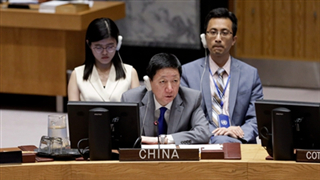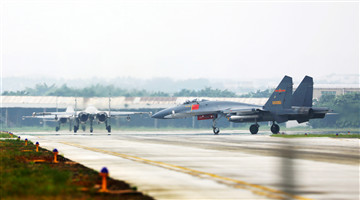
By Li Ci
India has made frequent moves recently to occupy the high ground in the space domain. Firstly, it claimed to have made a "substantial breakthrough" by successfully carrying out the anti-satellite (ASAT) missile test. Soon after the approval to set up the Defence Space Research Organization (DSRO), an establishment designated to develop space technologies, it announced to form the Defence Space Agency (DSA) to take the overall charge of national space affairs. And the latest news says that India will hold its very first simulated game of space warfare, according to the US website Defense News, such move is aimed to demonstrate India's determination to become a "space power", but it might be a little bit too ambitious!
A state of chaos
According to media reports,Indian government’s departments involved in space affairs have been in a state of chaos since the beginning of this year. This was due to the government’s overly ambitious goal after the successful first ASAT test,for which the Indian government has hoped to integrate its various departments and military systems with space activities to accelerate the development of space capability.
According to India's Business Standard, the DSA is responsible to command and control the space assets of the military in a unified way for the first time which was originally decentralized in and across the government and military systems. The Defence Image Processing and Analysis Centre (DIPAC), Satellite Control Center (SCC) and space units and assets (including ASAT capabilities) that used to belong to the army, navy and air force respectively will all be integrated under DSA's leadership. In June, the Indian Cabinet Committee on Security (CCS) chaired by Prime Minister Modi passed a resolution that approved the establishment of DSRO under DSA to provide R&D and technical support.
An official from the Indian Ministry of Defence said that the establishment of DSA and DSRO is aimed to enable India to make strategic utilization of the space. The two organizations have clear division of work. DSA is responsible for the top-level design, comprehensive coordination and unified dispatch while formulating the nation's space security policies and strategies and guiding its subordinate departments in work, whereas DSRO specializes in the research and development of space security technologies.
A strong military tendency
The website of Indian Defence Research Alliance claimed that in the 21st century, challenges and demands are expanding and changing faster than ever before, India should re-consider and re-position its space policies and strategies and shift the stably developing civilian space programs to military use, which was affirmed by the establishment of new space units.
Russia's Sputnik News Agency described the newly formed Indian space organizations as being highly military as the DSA was headed by an air marshal with 200 staff members from the military. Moreover, the scientists and engineers who make space weapons for the Indian government are also subject to DSA's leadership.
Business Standard said although the government positions DSA as the top national planner for space research and technology development, its main task is to gradually enhance the space capabilities (including ASAT capabilities) of Indian army, navy and air force and to organize, manage and carry out the nation's space warfare. The Modi administration said in a statement that one of DSA's duties is to identify current space threats to India and seek solutions, and Times of India said the new space agency may be turned into the Space Command in the future.
The DSRO has even more distinct military features and is described by Business Standard as a space weapon research organization. An official from Indian Ministry of Defence revealed that the congress has specified DSRO's purpose to enhance the space warfare capability of Indian armed forces and develop sophisticated space weapons and advanced space technologies. For that purpose, DSRO's personnel will closely communicate with staff officers in various military services. Furthermore, the organization is also tasked with integrating India's space technologies for national defence purposes.
A move to enhance presence in the space
According to Sputnik News Agency, India's DSA will coordinate with the Integrated Defence Staff of the Ministry of Defence to direct a "table-top" simulated space war game called IndSpaceEx in July to evaluate India's space security situation and Indian military's capabilities of space attacks and counterattacks.
According to senior Indian officials, in today's ever increasingly fierce space force competition, India needs reliable space deterrence to stop its enemies from destroying or controlling its monitoring, communication, missile early warning and accurate positioning abilities in space, which would make the Indian forces "deaf and blind" on the future battlefield. For this reason, India will be committed to developing new anti-space weapons, including directed energy weapons, lasers weapons, electronic pulse weapons and co-orbital ASAT weapons. The table-top simulated war game can test India's existing space defence and attack abilities on the one hand, and test its gaps from advanced countries on the other to set the next goal.
Experts commented that to hold the first simulated war game is India's way of telling the world that it can deal with space challenges. Being a new member of the exclusive "ASAT club" only included countries like the United States and Russia previously, India is no longer content with its space presence and will strive to become a "space power".
As fragile as a "paper giant"
Japanese magazine The Diplomat called the table-top war game simulation an important part of India's efforts to achieve its "space power" dream, but the country has much to do before reaching that goal. An article published on its website pointed out that India has a long way to go to become a real space power in terms of its space offensive and defensive capabilities, its study and judgment of various threats, and its ability to deal with them. Furthermore, its shortfall in capital, technology and national organization also make its dream of becoming a "space power" as fragile as a "paper giant".
Somehow, Indian media isn't optimistic about the country's space technology either. According to the website of Indian Defence Review magazine, the lack of space manufacturing ability itself would restrict India's development in that domain. "Hardly any company in India has the ability to design and manufacture large spacecraft and its sub-systems, and how can India become a space power without such abilities?"
Experts said as the space is a public resource shared for mankind, all countries should make joint efforts to preserve its security and stability rather than weaponize and militarize it. If countries, like India, all set up militarized space authorities and carry out space war game simulations, that will doubtlessly undermine the peaceful use of the space and cause a negative impact on regional security.











